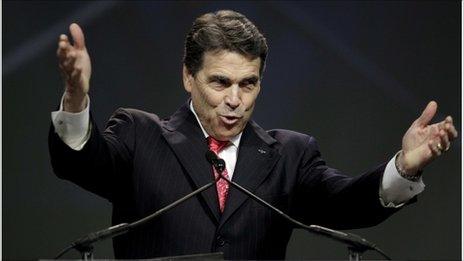Rick Perry's economy: Texas miracle or Texas curse?
- Published
- comments
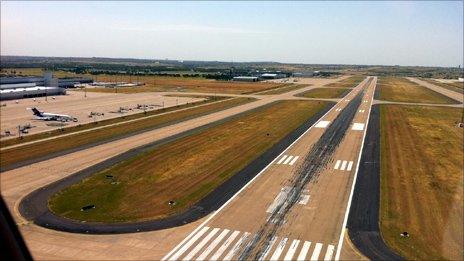
Everything's bigger in Texas - even the airports. Alliance, Texas boasts the largest cargo-only airport in the nation
Down below me, the Texas miracle is made manifest.
The helicopter swoops over the many sights that make up Alliance Texas, external, outside Dallas and Fort Worth. It is a project that has created 30,000 new jobs - 2,400 of them last year.
Some say that's down to the low-tax, low-regulation policy of the governor who would be president, Rick Perry. (Read Eight Things You Should Know about the Governor, external in Texas Monthly.)
From my bird's eye view I can see hotels and homes, roads, railway, and planes.
They say everything is bigger down here in Texas, and this is a business park the size of a town, larger than Manhattan.
It started life as transport hub. There is the airport, the biggest cargo-only airport in the USA.
Then we swoop over brightly coloured shipping containers, most of them from Asia via California. Next, we're on to rail and road links. An estate for billionaires is nestled next to two golf courses. Some of the identical luxury homes were recently snapped up by pop stars and TV celebrities I am asked not to name.
The wide open spaces between the developments is for ranching, but could also be built on.
That is because Alliance, Texas, like the state itself, is growing. In a nearly stagnant national economy Texas seems to be racing ahead. More than 260 companies are settled below me and more want to come here.
'Ship's captain'
The man behind Alliance, Texas knows a thing or two about presidential elections. Ross Perot Jr, external watched his dad, external make two unsuccessful stabs at becoming president in the '90s as an independent.
A billionaire in his own right, he says Mr Perry deserves the credit for what has happened in Texas.
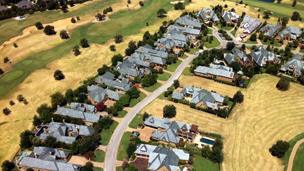
While communities are growing, some feel there is a lack of services for those who live there
"He's our governor so he's the captain of the ship," Mr Perot says. "It's his attitude and his vision that put in place the framework we have all enjoyed in this state in the past decade."
I point out that Texas enjoys many advantages that are nothing to do with the governor: its oil and gas, its high population growth, its climate (although I am less convinced of the benefit of this, sweltering in the 40.5C heat).
Mr Perot demurs.
"Look at California," Mr Perot urges. "Look at all the great natural resources. California: unbelievable people, unbelievable weather, fabulous ocean, look how the political leaders have screwed up that state. We don't have that in Texas we have great political leadership."
What is so great about it?
"It's pro-business, pro-growth, pro-jobs," he said. "They allow businessmen and women to do their job. They stay out the way. They give you a very good environment where you can grow and invest your capital. You know with certainly that the government will not try to interfere with your business or the return on that capital.
It's very low tax, low regulation and that ensures economic freedom. That is what makes this state special."
Chatting with Mr Perot after the interview he fondly mentions Lady Thatcher. She is often invoked here, and not just to me because I am British.
Texas is a Thatcherite dream incarnate, an experiment in the almost unbridled free market in a highly advanced society, with no state income tax and all other taxes kept down.
And the businessmen and women who grow rich here say it is a model the whole US should follow.
The Texas model
At the heart of the miracle is a city with an amazing story, external: Dallas.
Standing on the balcony of the 14th floor of the Dallas Federal Reserve, external, chairman and CEO Richard Fisher points out a modestly sized building.
"That was the tallest building in Dallas until 40 years ago," he says.
"The city has put on a remarkable growth spurt since then, and indeed one of its advantages is an infrastructure more up-to-date than LA, New York or Chicago."
Thirty-five major corporations are headquartered here, external. Mr Fisher says that whether you call it a miracle or not, something remarkable has happened in Texas.
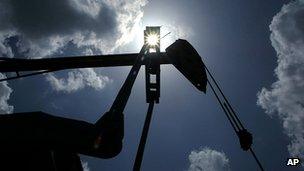
Texas is famous for the reserves of oil underpinning its economy
"We went in to the recession last and came out first," he says.
"Depending how you calculate it, since the recovery began, 49.9% all the jobs created in America have been created in Texas [A different measure makes it 29.2%]. And we only have 10% of the people."
You can read his detailed dissection of the figures and a trenchant take on America's future in a recent speech, external that manages to include a reference to Bertie Wooster's aunts as well as Lady Thatcher.
It is well worth a read, and explains why some see the Texas model as important not just for the US but for the world.
Mr Fisher points out that only around 2% of people work in oil or gas, and even though Texas is the biggest cotton producer in the world and has a huge cattle industry, it is not agriculture that accounts for its success.
Healthcare services have shown the biggest growth. Less in line with the ideology, government is not far behind.
Mr Fisher has no doubt that it is down to culture, and a choice.
"People here are not very pro-government," he says. "The legislature meets 140 days every two years. We pay them only $600 a month... [and that's] probably too much. We have a different attitude here to the role of government."
Trade-off
There's no doubt which political side Mr Fisher is on. But he is not a politician and can be honest that there is a price.
"We have very low taxes and as a result of that very low services," he acknowledges.
"Those that are doled out in modern societies to a greater or lesser degree don't exist much here. We also have an education system that is severely challenged, external. The nice thing with the US is that you don't have to be here [in Texas] - you can vote with your feet, you can go somewhere else.
"The numbers show that people are coming here in droves. Business are relocating here. Jobs are being created here. I think there is a trade-off."
Pastor Gerald Taylor of the Texas Organizing Project, external, which is aimed at helping low- and middle-income families, would say the trade-off is rather one-sided. The unemployment rate is a little below the national average at around 8%, external but well short of a miracle.
In conjunction with weak unions, the state's high unemployment rate enables employers to keep down wages. Some 9.5% of Texas workers earn the minimum wage or less, external.
Under a current round of budget cuts totalling $31bn (£19bn), education will receive 13% less, external than the previous year.
The pastor takes me to a poor area of Dallas called Oak Cliff, where he has been providing free food for the children while they are on holiday over the summer and missing school meals.
He drives me around the area, rows of single-story shotgun houses, some smartly painted with ornate fences and warnings to less diligent neighbours ("Trespassers will be shot. Survivors will be shot twice") others are dilapidated, falling apart.
There are many somewhere in between. The pastor points out the numerous drug houses. There is no doubt the area has been blighted for 20 years by crack and heroin and no one would claim these problems are of the governor's making.
But Pastor Taylor says Mr Perry's policies have crushed hopes and opportunity.
'Failing' education system
He tell a group of men: "It's easy to say it's a miracle when everyone you deal with living in million-dollar homes, driving hundred thousand-dollar cars, wearing thousand-dollar suits.
"If everyone around me was like that then I would be at ease. But this is what I have to deal with when I come back to my neighbourhood: people struggling to eat, people struggling to get a job, kids put out of school and an education system that is failing.
"If there's a miracle I really wish it would make way to our community because I don't see it."
He says to me: "I am scared for the country. If this is Rick Perry's mindset concerning Texas, what would happen if a person like that became president of the United States? He would duplicate this across the country. We're devastated. We need a miracle.
"The low taxes is good for the wealthy. No one really likes paying taxes. But if you lower the taxes it makes it easier for the haves to keep what they have and harder for the have-nots to get anything. Its not good for us."
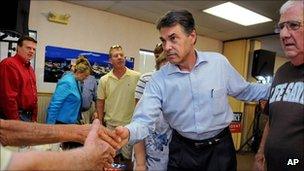
Since his entry into the race in mid-August, Rick Perry has soared to the front of the field
He says the low taxes have made for a bad education system and that balancing the books and making further cutbacks will make that even worse.
"Education is power," he says.
"If the kids don't get educated then they're destined to duplicate what they've seen. If we don't teach them and take them to a place where they can begin to dream and think better what else can they do?"
The men he's taking to are sat outside a run-down house on office chairs that have seen better days, around a rusty table, drinking water and Gatorade.
This is the home of a mechanic, but there's no work going on. I see the ripped-out backseat of a car to provide extra seating, and mechanical and electrical parts scattered on a table next to a totally empty and dusty tool box.
One man, Edward Atkins, tells me: "I am a certified electrician, I don't have no tickets, no warrants or anything, I have put out more than 100 applications and have nobody called me for a job."
Standard Republican policies
But James Piper surprises me a little:
"It's really rough right now, but I mean it's not [as] bad as a whole load of other states, there are a whole load of other states in a worse shape than we're in right now. Texas is prospering economically right now".
Has he got a job? "I'm sure I could get one if I applied myself."
There has been endless debate about the Texas miracle in American newspapers, external, of course viewed from Washington or New York, untainted by any visit to the state, most driven by partisan desire.
It seems to me it is about a choice. There's little doubt that employers and companies from outside the state are attracted by the low taxes and the light regulation, and certainly this is not going to change.
But this has consequences for healthcare, for education. Texas is not a good place to be poor, and may be not a good place for those who would like to climb out of poverty.
Whether or not Mr Perry wins the Republican nomination, Texas is still important.
It currently follows policies advocated by all of the Republican candidates for all of the states.
In some ways it is a mirror image of the America President Barack Obama vowed to create.
The Texas economy may feel like a miracle to some, but to others it is more like a diabolical torment.
Next year Americans will get a chance to choose whether it is a blessing or a curse.
- Published25 August 2011
- Published19 August 2011
- Published20 August 2014
